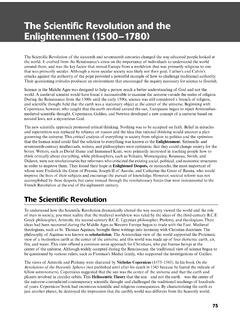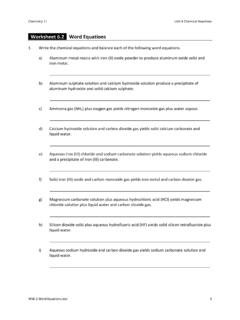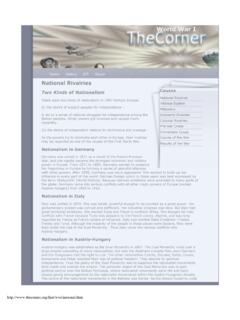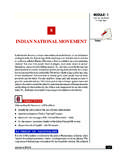Transcription of The Age of Imperialism (1870–1914)
1 145 The Age of Imperialism (1870 1914) Although the Industrial Revolution and nationalism shaped European society in the nineteenth century, Imperialism the domination by one country or people over another group of people dramatically changed the world during the latter half of that did not begin in the nineteenth century. From the sixteenth to the early nineteenth century, an era dominated by what is now termed Old Imperialism , European nations sought trade routes with the Far East, explored the New World, and established settlements in North and South America as well as in Southeast Asia. They set up trading posts and gained footholds on the coasts of Africa and China, and worked closely with the local rulers to ensure the protection of European economic interests. Their influence, however, was limited.
2 In the Age of New Imperialism that began in the 1870s, European states established vast empires mainly in Africa, but also in Asia and the Middle East. Unlike the sixteenth- and seventeenth-century method of establishing settlements, the new imperialists set up the administration of the native areas for the benefit of the colonial power. European nations pursued an aggressive expansion policy that was motivated by economic needs that were created by the Industrial Revolution. Between 1870 and 1914, Europe went through a Second Industrial Revolution, which quickened the pace of change as science, technology, and industry spurred economic growth. Improvements in steel production revolutionized shipbuilding and transportation. The development of the railroad, the internal combustion engine, and electrical power generation contributed to the growing industrial economies of Europe and their need to seek new avenues of expansion.
3 The expansion policy was also motivated by political needs that associated empire building with national greatness, and social and religious reasons that promoted the superiority of Western society over backward societies. Through the use of direct military force, economic spheres of influence, and annexation, European countries dominated the continents of Africa and Asia. By 1914, Great Britain controlled the largest number of colonies, and the phrase, the sun never sets on the British Empire, described the vastness of its holdings. Imperialism had consequences that affected the colonial nations, Europe, and the world. It also led to increased competition among nations and to conflicts that would disrupt world peace in ImperialismEuropean Imperialism did not begin in the 1800s. In their efforts to find a direct trade route to Asia during the age of Old Imperialism , European nations established colonies in the Americas, India, South Africa, and the East Indies, and gained territory along the coasts of Africa and China.
4 Meanwhile, Europe s Commercial Revolution created new needs and desires for wealth and raw materials. Mercantilists maintained that colonies could serve as a source of wealth, while personal motives by rulers, statesmen, explorers, and missionaries supported the imperial belief in Glory, God, and Gold. By 1800, Great Britain was the leading colonial power with colonies in India, South Africa, and Australia. Spain colonized Central and South America. France held Louisiana and French Guinea, and Holland built an empire in the East the first half of the nineteenth century, colonialism became less popular. The Napoleonic Wars, the struggle for nationalism and democracy, and the cost of industrialization exhausted the energies of European nations. Many leaders also thought that the costs to their respective empires outweighed the benefits, especially the cost of supervising the colonies.
5 However, in the mid-nineteenth century, Europe especially Great Britain and France began an economic revival. During the Victorian Era, which lasted from 1837 to 1901, Great Britain became an industrial giant, providing more than 25 percent of the world s output of industrial goods. In France, Napoleon s investment in industry and large-scale ventures, such as railroad building, helped to promote prosperity. Thus the Industrial Revolution stirred ambitions in many European countries and renewed their confidence to embark on a path of aggressive expansion I: Subject Area Reviews with Sample Questions and Answers146 New ImperialismFrom the late 1800s through the early 1900s, Western Europe pursued a policy of Imperialism that became known as New Imperialism . This New Imperialist Age gained its impetus from economic, military, political, humanitar-ian, and religious reasons, as well as from the development and acceptance of a new theory Social Darwinism and advances in ReasonsBy 1870, it became necessary for European industrialized nations to expand their markets globally in order to sell products that they could not sell domestically on the continent.
6 Businessmen and bankers had excess capital to invest, and foreign investments offered the incentive of greater profits, despite the risks. The need for cheap labor and a steady supply of raw materials, such as oil, rubber, and manganese for steel, required that the industrial nations maintain firm control over these unexplored areas. Only by directly controlling these regions, which meant setting up colonies under their direct control, could the industrial economy work effectively or so the imperialists thought. The economic gains of the new Imperialism were limited, however, because the new colonies were too poor to spend money on European and Political ReasonsLeading European nations also felt that colonies were crucial to military power, national security, and nationalism . Military leaders claimed that a strong navy was necessary in order to become a great power.
7 Thus, naval vessels needed military bases around the world to take on coal and supplies. Islands or harbors were seized to satisfy these needs. Colonies guaranteed the growing European navies safe harbors and coaling stations, which they needed in time of war. National security was an important reason for Great Britain s decision to occupy Egypt. Protecting the Suez Canal was vital for the British Empire. The Suez Canal, which formally opened in 1869, shortened the sea route from Europe to South Africa and East Asia. To Britain, the canal was a lifeline to India, the jewel of its empire. Many people were also convinced that the possession of colonies was an indication of a nation s greatness; colonies were status symbols. According to nineteenth-century German historian, Heinrich von Treitschke, all great nations should want to conquer barbarian and Religious GoalsMany Westerners believed that Europe should civilize their little brothers beyond the seas.
8 According to this view, non-whites would received the blessings of Western civilization, including medicine, law, and Christianity. Rudyard Kipling (1865 1936) in his famous poem, The White Man s Burden expressed this mission in the 1890s when he prodded Europeans to take up their moral obligation to civilize the uncivilized. He encouraged them to Send forth the best ye breed to serve your captives need. Missionaries supported colonization, believing that European control would help them spread Christianity, the true religion, in Asia and DarwinismIn 1859, Charles Darwin (1809 1882) published On the Origin of Species. Darwin claimed that all life had evolved into the present state over millions of years. To explain the long slow process of evolution, Darwin put forth the theory of natural selection.
9 Natural forces selected those with physical traits best adapted to their environment. Darwin never promoted any social ideas. The process of natural selection came to be known as survival of the fittest. The Englishman Herbert Spencer (1820 1903) was the first to apply survival of the fittest to human societies and nations. Social Darwinism fostered imperialistic expansion by proposing that some people were more fit (advanced) than others. The Europeans believed that they, as the white race, were dominant and that it was only natural for them to conquer the inferior people as nature s way of improving mankind. Thus, the conquest of inferior people was just, and the destruction of the weaker races was nature s natural Age of Imperialism (1870 1914) 147 Western TechnologySuperior technology and improved medical knowledge helped to foster Imperialism .
10 Quinine enabled Europeans to survive tropical diseases and venture into the mosquito-infested interiors of Africa and Asia. The combination of the steamboat and the telegraph enabled the Western powers to increase their mobility and to quickly respond to any situations that threatened their dominance. The rapid-fire machine gun also gave them a military advantage and was helpful in convincing Africans and Asians to accept Western control. The following table summarizes the causes of the new Imperialism :Causes of New ImperialismEconomicMilitary/PoliticalHum anitarian/ReligiousTechnologicalNeed for marketsNeed for military basesWhite man s burdenNew medicineRaw materialsNational securitySpread of ChristianityNew weaponsSource of investmentsSource of pride nationalismSocial Darwinism (superiority of Western society)TransportationImperialism in AfricaAfrica was known as the Dark Continent and remained unknown to the outside world until the late nineteenth century because its interior desert, mountains, plateaus, and jungles discouraged exploration.













